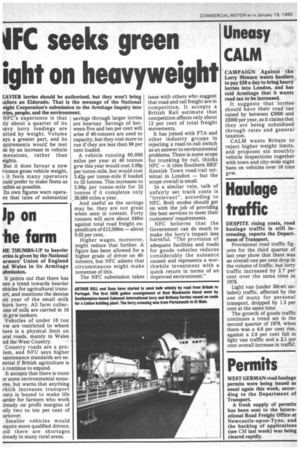1FC seeks green ight on heavyweight
Page 6

If you've noticed an error in this article please click here to report it so we can fix it.
EAVIER lorries should be authorised, but they won't bring cullers an Eldorado. That is the message of the National eight Corporation's submission to the Armitage Inquiry into rries, people, and the environment.
NFC's experience is that fly about a quarter of its avy lorry loadings are nited by weight. Volume ays a greater part, and its quirements would be met st by an increase in vehicle mensions, rather than eights.
But it does favour a new 1-tonne gross vehicle weight, ; it feels many operators ould prefer to make fleets as ?.xible as possible.
Its own figures warn operairs that tales of substantial savings through larger lorries are hearsay. Savings of between five and ten per cent will arise if 40-tonners are used to capacity, but they cost more to run if they are less than 90 per cent loaded.
A vehicle running 60,000 miles per year at 40 tonnes gvw this year would cost 3.09p per tonne-mile, but would cost 3.42p per tonne-mile if loaded to 32 tonnes. This increases to 3.99p per tonne-mile for 32 tonnes if it completes only .30,000 miles a year. And useful as the savings may be, they are not great when seen in context. Forty tonners will save about £40m against total road freight expenditure of £13,500m — about 0.02 per cent.
Higher wages, moreover, might reduce that further. A figure has been allowed for a higher grade of driver on 40tonners, but NFC admits that circumstances might make nonsense of this.
The NFC submission takes issue with others who suggest that road and rail freight are in competition. It accepts a British Rail estimate that competition affects only about 12 per cent of total freight movements.
It has joined with FTA and other industry groups in rejecting a road-to-rail switch as an answer to environmental problems. There is some scope for trunking by rail, thinks NFC — it cites Southern BRS' Kentish Town road/rail terminal in London — but the scope overall is small.
In a similar vein, talk of unfairly set track costs is "irrelevant", according to NFC. Both modes should get on with the job of providing the best services to meet their customers' requirements.
NFC believes that the Government can do much to make the lorry's impact less harmful. "The provision of adequate facilities and roads for goods vehicles reduces considerably the nuisance caused and represents a worthwhile investment with a quick return in terms of an improved environment."












































































































